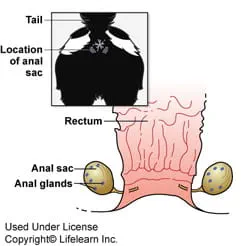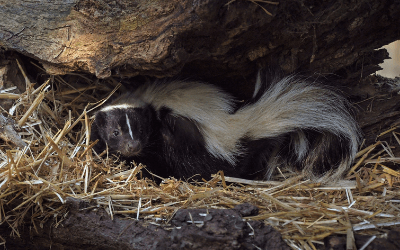How Soon Can a Skunk Spray Again After Its Already Sprayed?
Where does skunk spray come from? 
Skunks have a pair of specialized sacs located in their anus; each sac is connected to the exterior by a small duct that opens only inside the anus. The sacs are just pouches that store an extremely foul smelling secretion produced by glands that line the sacs.
What is in skunk spray?
Although the actual chemical composition of skunk spray is primarily of interest but to chemists and biologists, it is necessary for the boilerplate dog owner to empathise a little near the nature of skunk spray in gild to neutralize information technology effectively.
"Skunk odor becomes more pungent when the animal becomes moisture."
The secretion itself is a yellowish oil that will cling to most surfaces that contacts; like all oils, information technology does non mix with water. Chemically, skunk spray contains equally many as 7 dissimilar volatile compounds (compounds that readily go gas) that are responsible for its repulsive smell. These compounds are thiols or thioacetates. Most thiols bind strongly and quickly to skin proteins.
Although thioacetates are usually less smelly than thiols, they are readily converted into thiols when they are mixed with h2o. This is the reason why skunk odor becomes more than pungent when the beast becomes wet.
Why do skunks spray?
Skunks are naturally very docile animals and rarely take the offensive. Nevertheless, if a skunk becomes alarmed or is threatened by another brute or a person, information technology will employ the spray as a defensive weapon. The distinctive color and markings of skunks acts as an effective visual alert to animals that take had a previous skunk see; yet, this visual warning is ineffective to 'inexperienced' dogs. Before unleashing its repugnant spray, almost skunks try to deter the threatened attack past hissing, stamping their feet, and arching their tails high over their backs. If the threat persists, the skunk will have aim and fire its spray at the target. Skunks are capable of ejecting their spray across a distance of several anxiety (some sources say up to 5 meters or fifteen anxiety).
When or where is a skunk encounter probable to happen? 
Whether you live in a residential jungle or spend time in cottage land, the odds of coming together up with a skunk increase in the warmer months of the year. During the winter months, skunks are generally less active and rarely eat. While they exercise not hibernate for the wintertime, they do spend about of their time in their dens for warmth. In the warmer months, they tend to be virtually active around dawn or dusk, although they may be out foraging for food at other times of the day or night.
In the wild, virtually skunks alive in a den that they dig in the ground, but they may too happily make their dwelling in a tree stump, woodpile, cave, rock pile, or abased building. In populated areas, skunks are oft content to make a dwelling house in your garden shed, below your deck, or in the crawl space nether your cottage.
Many skunks volition select their home based on convenient admission to a food source, that may be an ample supply of grubs and insects in the lawn, a handy compost heap, a convenient garbage bin, or a set up-to-eat buffet from your dog's or true cat's food dishes if kept outdoors.
Skunks mate in late wintertime/early spring and the females are significant for a little over 2 months. Male person skunks do not participate in the rearing of their young. The babies or kits are weaned when they are about two months of historic period, but stay with their mother until they are 6-12 months former. The mother skunk is very protective of her kits, and volition spray at any sign of danger to them.
How can I lessen the chances of my dog meeting a skunk?
Since skunks tend to be more active at dawn and dusk, avoid taking your dog for a walk in wooded areas or letting your dog out in the yard during these times of the day. Although you are often able to detect the telltale smell of a skunk before it gets too close, sometimes in that location may be no warning that a skunk is nearby.
"Since skunks tend to be more active at dawn and dusk, avoid taking your dog for a walk in
wooded areas or letting your dog out in the k during these times of the twenty-four hour period."
Take steps to make your property less bonny to skunks. Eliminate readily available food sources such every bit garbage or pet nutrient. Board up or otherwise block access to sheds and areas beneath your deck or porch. Remove piles of brush or wood and whatsoever expressionless tree stumps that might brand an appealing shelter to a skunk.
How tin can I get rid of skunk olfactory property on my dog?
Sometimes, in spite of your best efforts, a skunk will spray your dog. Most usually, dogs will be sprayed on or around the head. Not only does skunk spray aroma extremely foul, it will cause nausea or vomiting and in rare cases severe anemia if swallowed and will human action similar tear gas if it gets in the eyes. If your dog gets sprayed straight in the eyes or mouth, seek immediate veterinary treatment. This is particularly important if the spray gets in your canis familiaris'southward eyes, since information technology can harm the delicate cornea of the eye and crusade temporary blindness. If the spray is non causing serious distress to your dog, you can take matters into your own hands so that your domestic dog volition be welcomed back into your habitation.
To neutralize the odor associated with skunk spray, you need to break downward the oils so that they tin can be done off the fur or skin. Just you also need to change the chemical structure of the volatile compounds so that they become substances with lilliputian to no odor. In spite of the old wives' tale, tomato juice just does non work to do this; it only makes a big mess! Nor does vinegar piece of work effectively.
"To neutralize the smell associated with skunk spray, yous need to break down the oils
so that they can be washed off the fur or skin."
Chemists have developed several commercial products; some of these products are more than effective than others at neutralizing skunk spray. Unfortunately, many encounters between dogs and skunks occur in the late evening or middle of the nighttime when stores and veterinarian clinics are airtight, meaning that you cannot go and buy the product when you lot need it. Past studying the nature of the secretions, scientists have determined what combination of products readily available effectually the home have the potential to help neutralize skunk odor on your dog. Most bootleg recipes involve a combination of hydrogen peroxide, blistering soda, and dish detergent in varying amounts; the most common is 3-iv parts hydrogen peroxide to 1 part of baking soda, with a teaspoon or so of dish detergent added.
The dish detergent breaks down the oil so that information technology tin be washed away, while the hydrogen peroxide and baking soda human action as oxidizing agents, changing the chemic structure of the thiols into odorless sulfonic acid compounds. To be effective, the solution must be used while 'fresh', or still bubbling, and must be applied directly to the sprayed areas.
Are there any concerns with using a homemade scent neutralizer?
Yep. You lot should never use solutions that contain peroxide near the eyes, and you must exist very cautious about applying them in the mouth. Y'all need to be aware that the peroxide may bleach your dog's fur, and this is especially noticeable if your domestic dog is black or dark brownish. Also, the peroxide can bleach any material information technology may come up in contact with (such as your clothes or piece of furniture).
"You should never utilize solutions that contain peroxide near the eyes,
and you must be very cautious almost applying them in the mouth."
When using the bootleg production, it is mutual to notice the 'eau de skunk' smell every time your dog gets wet over the side by side few months. This rarely occurs when a commercial odor eliminator is used correctly.
Is at that place annihilation else I should exist aware of?
In both Canada and the United states, skunks are carriers of rabies virus. On an almanac basis, approximately twenty% of the animals that exam positive for rabies in the The states are skunks, while in Canada, 40% are skunks.
What is the all-time advice?
If you cannot purchase a commercial odor neutralizer, you can get temporary relief by using the homemade recipe above. For permanent emptying of the aroma on your canis familiaris, utilize a commercial odor neutralizer that is recommended by your veterinarian. Employ a commercial production that is safe for utilize on your effects or other contaminated clothing. However, the best advice is to avoid contact betwixt your domestic dog and any resident skunks in your area, not only for the sake of your nose, but also to avoid whatsoever potential for exposure to rabies.
harrislearallings.blogspot.com
Source: https://vcahospitals.com/know-your-pet/skunk-spray-and-your-dog
0 Response to "How Soon Can a Skunk Spray Again After Its Already Sprayed?"
Post a Comment